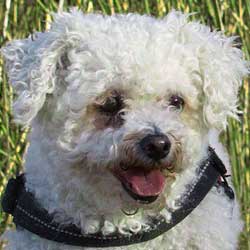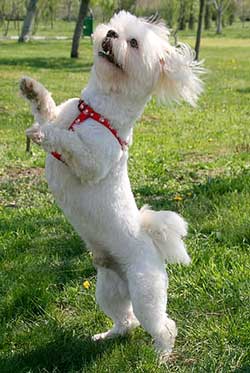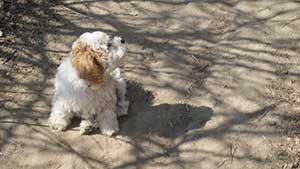
If you have ever wanted to have a living and breathing teddy bear that you can call your own, the Bichon Poodle mix is the dog for you.
These adorable puppies are a designer crossbreed that has become incredibly popular in the last couple of decades. It’s not hard to see why!
With their thick coat of curly fur and adorable faces, these dogs are the closest you’re going to get to a living teddy bear.
They’re small dogs with loving personalities. They feel right at home on your lap and are always eager to give you some kisses.
Also known as the Bichpoo or Poochon, these pups have a lot to offer.
They’re quite easy to care for and have a lot of desirable traits passed down from their two parent breeds.
Whether you’re a seasoned dog owner looking for a fun addition to your family or you’re thinking about making the Bichpoo your first pet, it’s important to understand everything you can about these dogs.
Like any breed, the Bichon Poodle mix has some distinct care requirements. T
he goal is to provide your pup with a happy and healthy, right? To do that, you’ll need to understand their unique traits, personality quirks, and health requirements.
The History of the Bichon Poodle Mix
Bichon Poodle mix dogs are a relatively new crossbreed. They were originally developed in Australia during the 1990s. The 90s were huge for the designer dog craze.
While crossbreeds have been around for centuries, the 90s kickstarted a trend that resulted in a lot of beloved mixed-breeds.
Many of the designer dogs developed during this time were small and pint-sized.
The Bichon Poodle mix is no different. It was specifically created to be the “perfect” lapdog for families.
About the Parent Breeds
To understand any crossbreed, it’s important to learn more about the purebred canines used to create it. The Bichon Poodle mix was developed by crossbreeding a Bichon Frise and a Poodle.

The Bichon Frise breed has roots that date back to the 1300s. They were revered by sailors and were often used as sailing dogs. That’s a fry cry from the pampered pooches we known today.
Their image of sophistication and elegance didn’t start until around the 1500s when they were kept by French Nobility.
It wasn’t until 1955 that the Bichon Frise made its way to the United States.

Poodles can be traced back to Europe during the 15th century. They were a common staple in old renaissance paintings by some big-name artists.
When they were brought to the United States, Poodles became working dogs that hunted and retrieved fowl.
To create the Bichon Poodle mix, the Bichon Frise is crossbred with a Standard, Miniature, or Toy Poodle. Miniature and Standard Poodle parents are the most common.
However, if you do come across a breeder that uses Toy Poodles, the resulting puppy is often referred to as a Toy Bichon Poodle mix.
First Generation Puppies
Most breeders will usually offer first-generation puppies only. This means that all of the puppies are directly born from the purebred parents.
This is done to help avoid many of the common health ailments associated with Bichon Frise and Poodle dogs.
In most cases, major complications skip a generation.
Second and third-generation Bichon Poodle mixes do exist, but they tend to have more health issues than their first-generation counterparts.
Pedigree and Kennel Club Recognition
Because they are a designer crossbreed, Bichon Poodle mixes aren’t officially recognized by the American Kennel Club. They are, however, recognized by the ACHC.
The American Canine Hybrid Club isn’t as well-known as the AKC, but it provides an important service.
The club establishes strict breeding guidelines to help owners ensure that they’re getting an official Bichon Poodle mix.
For this crossbreed, the ACHC will only recognize first-generation pups born by a purebred Minature or Toy Poddle and purebred Bichon Frise.
Physical Appearance of the Bichon Poodle Mix
There’s no denying that these dogs are cute! They’re small and have a very distinct coat of fur that you can’t miss.
Because there are no true breeding standards, you might see some variation among puppies.
Puppies will always take traits from their parents. However, genetics can get very complicated, so there’s no way to know for sure how a crossbreed will look until it’s born.
Size and Stature

Generally, a mature Poochon will weight between 6 and 18 pounds. Teacup or toy varieties will usually tip the scales at about 10 pounds.
Unlike other dog breeds, there are no major size differences between male and female Bichon Poodle mixes. Females can be just as large as the males.
These are small dogs. When fully grown, they usually only get to be between 9 and 15 inches at the withers. This is the point between the shoulder blades.
Coat
The coat of the Bichpoo is one of its most interesting physical features.
These dogs take the curly hair from Poodles. It’s long, wavy, and incredibly soft. The dogs have a single coat of fur, which makes things much more manageable.
Like the Poodle, Bichon Poodle mixes don’t shed like a traditional dog. They don’t release a ton of dander, either! As a result, they’re perfect for allergy sufferers who are unable to care for other shedding dogs.
While they don’t release hair all over your home, they do have some strict grooming requirements. We’ll get into those soon.
Usually, the coat is tan, brown, or white. Oftentimes, brown pups will have some patches of white on their belly or back.
Personality and Temperament of the Bichpoo
Personality can vary from dog to dog. Canines are a product of their environment. A big factor in whether a dog is aggressive or not is proper socialization.
Exposing your dog to new sights, sounds, people, and animals at a young age will make them feel more comfortable as an adult. Plus, it can stave off bad behavior.
While personality traits can vary dramatically, you can look to the parent dogs to get a better idea of what to expect.
Owning a Bichon Poodle mix is light hitting the genetic jackpot when it comes to personality!
Both the Bichon Frise and the Poodle are known for being well-tempered and intelligent dogs! Those traits are typically passed down to the Bichon Poodle mix.
These dogs are social butterflies. They love playing and are down to have fun at all hours of the day!
Bitchpoos do just fine with children, making them a great addition to your family.
Interaction with other Pets
Bichpoos can also get along great with other dogs and pets in the home.
Though, you must exercise some caution and introduce the animals slowly at a young age. Sudden introductions may not go too well. This goes with other humans, too.
These dogs are big barkers. The behavior isn’t necessarily a sign of aggression. In most cases, it’s just about being excited.
They have a bit of a reputation for being loud and yappy. On one hand, the behavior can be annoying. It requires some strict training to get control of.
However, the barking can also be used to your advantage.
Despite their tiny size, they make wonderful watchdogs. They’ll let you know if anyone comes to your door before they even have a chance to knock.
Related : How to Stop My Dog from Barking When Walking Outside?
Training a Bichon Poodle Mix
Smaller dog breeds aren’t known for being the easiest to train.
We’re happy to say that’s not the case with the Bichon Poodle mix. As we mentioned earlier, these pups are very intelligent. They pick up commands fairly quickly and aren’t too difficult to housetrain.

Positive reinforcement is the technique of choice. Bichpoos respond well to praise. However, they will develop severe behavioral issues if hit or yelled at.
You should never use negative punishments as a training tool. Doing so will only cause these dogs to grow fearful of you.
Provide plenty of love and treats during your training. Reward your dog for all the good things they do and remain firm on your training methods.
Because these dogs are so smart, they can grow independent if you start to get lax on the rules.
Keep up your training and your Bichon Poodle mix should do fine.
Potential Behaviorial Issues
Like any dog, the Poochon is prone to some behavioral issues.
The good news is that they are all completely avoidable. One of the biggest issues that owners face is keeping their pups occupied.
Don’t make the mistake of thinking that these small dogs are simple-minded creatures. They need constant mental stimulation to stay happy!
A lack of proper stimulation can make your dog turn to destructive behavior or anxiety. Give them some puzzles to try out.
There are tons of puzzle toys on the market these days.
They work wonders on intelligent dogs by constantly challenging the mind. You can also try expending some of that mental energy on obstacle courses and agility training.
Bichon Poodle Mix Care Guidelines
For the most part, Bichon Poodle mix dogs are easy to care for. They’re quite forgiving and adapt well to a wide range of environments.
That said, you still need to provide them with the basics!
Grooming
Grooming is paramount for Bichon Poodle mixes.
They don’t shed like other dog breeds. But that doesn’t mean that their fur is maintenance-free. It’s quite the opposite!
These dogs need regular trims. Their fur is capable of growing to some pretty impressive lengths.
With its curly texture, your dog will be a giant ball of fur without some regular grooming sessions.
It’s recommended that Bichon Poodle mixes have their fur trimmed and coifed at least every two months. Depending on your pup’s lifestyle, you may have to increase that to a monthly effort.
Regular shampooing during these sessions is required as well.
In addition to cuts, it’s important to brush your dog’s fur every day.
The unique texture of their coat makes it very susceptible to tangles and mats. The last thing you want to deal with is a mess of matted hair.
You can avoid those issues altogether by using a detangling brush to keep the fur loose, soft, and shiny. Conditioning sprays are also a good option.
Finally, Bichpoos need special attention to their teeth. The crossbreed is at risk for severe dental problems.
We’ll touch on that in a bit. But for now, the most important thing you should know is that dental care needs to be a part of your dog’s daily routine.
Brushing their teeth at least once a week is a must. For those days in between, provide a dental chew that can use your dog’s mechanical chewing action to get rid of plaque and grime.
Diet
Your dog’s diet is going to have a huge effect on their health, so take some time in finding the right food. You need to choose a high-protein kibble that will support your pup’s energy levels.
For Bichon Poodle mixes, dry kibble is recommended. The chewy action can help to improve the quality of the teeth.
It’s a good idea to go with a formula that’s specifically made for small breeds. The dietary requirements of a Bichpoo are going to be different from that of a Great Dane.
Foods made for small breeds address those unique needs and can help your dog avoid excessive weight gain.
Related : Best Puppy Foods for Poodles
On average, Poochons will need roughly 500 calories a day.
This can be higher or lower based on your pup’s weight and lifestyle. So, we recommend consulting with your vet for exact measurements.
Those calories should be split up into three smaller meals that you can provide throughout the day.
Exercise
Bichon Poodle mixes are already quite active enough. They don’t need a ton of outside exercise. In most cases, they’ll need about 30 to 45 minutes of activity a day.
This can be spent playing around inside the house, going on walks, or more.
Bichpoos are unique in the fact that they prefer short bursts of activity. These dogs will be running around the house one second and lounging on the couch the next!
To accommodate your dog’s needs and preferences, try splitting up those exercise sessions into 10-minute chunks throughout the day.
Potential Health Problems for the Poochon
Most of the major health issues from the Bichon Frise and Poodle parents skip over the offspring. However, these designer dogs are still known to suffer from a couple of ailments.
The most common is periodontal disease.
This is a dental issue that’s directly caused by plaque and gingivitis. Eventually, plaque can cause infection below the surface of the gums.
This can lead to extremely bad breath, tooth decay, and more. Many Bichon Poodle mixes end up having to get teeth extracted at some point.
You can do your part to preserve your dog’s teeth. Provide daily dental treats and teach your dog early on not to be scared of the toothbrush.
Once you get your dog comfortable with teeth cleaning, you can do it more to keep those pearly whites in good shape.
Another issue that affects Bichon Poodle mixes is Progressive Retinal Atrophy.
This is an ocular issue passed down from both parents. Unfortunately, there is no proven treatment method to take care of the issue.
Some say that supplements help to improve ocular health.
Though, the jury is still out. The key to managing the disease is to catch it early on so that you can accommodate your dog’s changing eyesight.
Conclusion
Bichon Poodle mix dogs can be a real joy to raise and make excellent additions to the family. They’re a unique crossbreed that combines traits from two of the most popular purebred dogs around!
They’re cute, sociable, and very intelligent. What’s not to love?
Also Read: Best Rated Large Breed Puppy Foods

